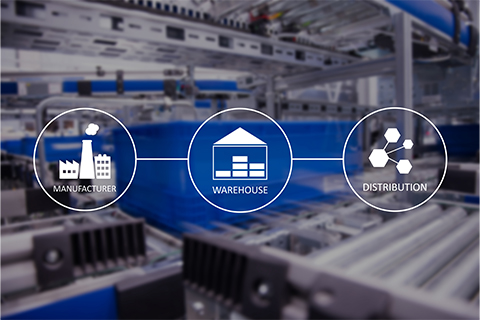Digital Supply Chain (DSC)
Read more

The progress of digitization is having a major impact on a wide variety of areas of life. Consumer behavior in particular is undergoing major changes. Consumers are digitally networked and exchange information with each other on various platforms around the world. Customer wishes are thus emerging and changing rapidly.
This poses an enormous challenge to the supply chain. This is mainly due to its traditional and linear structure. Problems along the value chain often cannot be identified quickly enough. This in turn leads to a reduced response time of companies to changes in consumer demands.
Digitizing the supply chain is an opportunity to optimize processes and increase company efficiency. In this article, you will learn more about the importance and benefits of the Digital Supply Chain (DSC) and why DSC is the key to the digital future.
The traditional supply chain initially describes the entire process from the customer's order to delivery and payment for the product or service. It thus includes the planning, execution and control of all activities - from the purchase of raw materials to the final delivery of the product to the consumer.
However, supply chains are becoming more extensive and complex. To ensure better coordination of the processes, the various stations along the supply chain should therefore be linked with each other. In addition, reliable forecasts should be possible for all participants from the manufacturer to the end consumer. The Digital Supply Chain makes this possible.
The Digital Supply Chain (DSC) connects all actors and processes within the value chain using advanced technologies to increase visibility and control along the supply chain. Among other things, this allows better decisions to be made about the sources of materials needed, the demand for products, and all the links in between.
The supply chain thus becomes more dynamic and can adapt to rapidly changing circumstances. Information is thus presented in real time and can be easily accessed by all companies along the supply chain.
Digital supply chains encompass modern processes, strategies and technologies, including:
For many companies, the question arises as to why they should digitalize their supply chain. To answer this, it helps to compare the traditional supply chain with the digital supply chain.
A major disadvantage of the traditional supply chain is that problems along the supply chain are often identified too late. Even after the problem is identified, it can take some time and effort to fix. This delays production, leads to errors and extends time-to-market. Another shortcoming is limited visibility and lack of real-time data, making it difficult to identify gaps and analyze performance.
On the other hand, networking into a Digital Supply Chain can lead to a larger task for companies to manage. However, various technologies can be helpful here. Intelligent automation tools and analytics can simplify the planning and management of digital supply chains. These tools also enable process automation integration, rapid response to customer demands, and better insight into the entire supply chain.
Real-time, up-to-date data is also a serious difference from the traditional supply chain, where it cannot be collected as quickly. With this up-to-date data and reporting, the following can be influenced and optimized:
The Digital Supply Chain (DSC) connects all actors and processes within the value chain using advanced technologies to increase visibility and control along the supply chain. Among other things, this enables better decisions to be made about the sources of materials needed, the demand for products, and all the links in between.
DSC offers companies significant advantages:
Have you already started your transformation to DSC? The following questions will help you determine whether your Digital Supply Chain is on the right track:
In today's era of digitalization, it is of great advantage to digitalize your supply chain. Digital supply chains are more resilient and adaptable to future challenges and opportunities. Without the transformation to DSC, it will be almost impossible to remain competitive in the future.
The transformation towards a Digital Supply Chain is not without risk, but enables companies to control all processes in real time and digitally connects people, processes and things. In addition to cost benefits and increased flexibility, business effectiveness and efficiency are strengthened.
Take on the challenges of the transformation to the Digital Supply Chain and remain competitive in the future!
IGZ offers you comprehensive support on the way to your digital supply chain. If you have any questions, please feel free to contact us for a joint exchange.